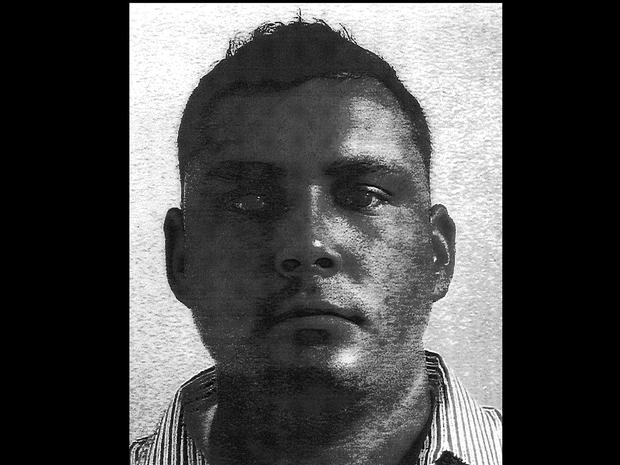Tech charged as "serial infector" in N.H. hepatitis C outbreak worked in at least 6 states
(CBS/AP) One of the 30 people believed to have been infected with hepatitis C by a traveling medical technician accused of reusing needles at a New Hampshire hospital's catheterization lab is suing a Nebraska-based health staffing agency.
Lab tech David Kwiatkowski, indicted in N.H. hospital hepatitis C outbreak, denies drug use
Exeter Hospital lab tech indicted in New Hampshire hepatitis C outbreak
Robert Fowler of Seabrook, N.H., was diagnosed with the blood-borne liver-damaging disease in June, 14 months after he underwent a cardiac catheterization at Exeter Hospital. Fowler was treated at the hospital's cardiac lab a month after it hired David Kwiatkowski, 33, who was charged last week with federal drug crimes.
Kwiatkowski is accused of stealing anesthetic drugs from the lab, injecting himself and contaminating syringes that were later used on patients, what's known as "drug diversion."
Though he told investigators he was diagnosed with hepatitis C in May, authorities said there is evidence Kwiatkowski has had the disease since at least June 2010.
In a lawsuit filed Sunday in federal court in Nebraska, Boston lawyer Domenic Paolini alleges that Triage Staffing Inc. was negligent in hiring, employing and supervising Kwiatkowski as a traveling technician and in sending him to Exeter. He argues that Triage should have known of the likelihood that Kwiatkowski would cause harm and that the company intentionally misrepresented his qualifications and employment record.
Triage's president did not return calls seeking comment Friday or Monday.
Former patients of the catheterization lab have also filed lawsuits against Exeter Hospital.
Kwiatkowski, who grew up in Michigan, worked as a "traveler" sent by staffing agencies to hospitals around the country, usually for temporary jobs. Federal prosecutors say he has worked in at least six states since 2007.
Though authorities have not publicly identified all the states, health officials in Michigan, Maryland, Kansas and New York have confirmed his employment. He worked at Exeter Hospital from April 2011 until May, when he was fired after the outbreak was discovered.
A spokesman for The Johns Hopkins Hospital said Kwiatkowski worked in the cardiac catheterization lab at the Baltimore hospital from July 2009 to January 2010. Spokesman Gary Stephenson said the hospital is contacting all patients who may have come in contact with Kwiatkowski to offer them free testing for hepatitis C.
In Michigan, the state Department of Community Health confirmed that Kwiatkowski had worked there, though officials were still figuring out exact locations.
According to court documents, Kwiatkowski told investigators he did not steal drugs, is "not a shooter,"and is scared of needles. He also said he was allergic to fentanyl, the anesthetic more powerful than morphine that he's accused of stealing, though medical records indicate he was given the drug during a medical procedure in 2011.
"I did not take any drugs or do any drugs ... and I'm gonna stick to that," he told investigators. When he was told that a syringe bearing a fentanyl label was found in a bag in his vehicle, he said it was not his and suggested that it had been planted by a co-worker.
Former co-workers in other states told investigators that Kwiatkowski was known for telling false stories, including saying that he had cancer. According to court documents, he was fired for falsifying his timesheets at one hospital, was accused of stealing fentanyl from a hospital operating room in 2008 and aroused significant suspicion in Exeter, where co-workers said he sometimes looked like he was "on something."
One co-worker said he recalled seeing a red-faced, red-eyed Kwiatkowski with white foam around his mouth. Others said he was at times shaky, sweaty and looked like he was "on something." When a worker complained, Kwiatkowski told a supervisor he had been up since 3 a.m. crying over his aunt's recent death; his parents later told investigators no relatives had died in the last several years. They also said that while their son took prescription medication and had alcohol and anger problems, he did not use illegal drugs.
Officials at both Exeter Hospital and The Johns Hopkins Hospital said Kwiatkowski underwent drug testing and a criminal background check before being hired.
In a statement Friday, Exeter Hospital said that while employees raised concerns about Kwiatkowski's appearance, none suspected him of diverting medication. In each case, Kwiatkowski provided plausible explanations related to either personal medical issues or family crises, the hospital said.
"David had stories for everything that pulled at your heart strings and we had no reason to disbelieve him," said Dr. Thomas Wharton, who oversees the cardiac catheterization lab. He said he now views Kwiatkowski as "the ultimate con artist and an extremely good cardiac technologist who pulled the wool over everyone's eyes."
The hospital said it performed additional background checks on Kwiatkowski when he was hired into a full-time position in October. Kwiatkowski held the required certification for the job and was given good references from his previous two employers, including one who had said "David has been invaluable in helping us get our lab up and running."
Authorities said Kwiatkowski was not authorized to handle medication at Exeter Hospital but they believe he may have switched syringes that were filled by others and set down with syringes he had used and refilled with another liquid, possibly saline. Colleagues told investigators that Kwiatkowski often came in the lab on his days off or attended procedures he wasn't assigned to, and would bring nurses the lead aprons they wear to protect against radiation exposure.
When asked how the patients had contracted hepatitis C, Kwiatkowski told police, "You know, I'm more concerned about myself, my own well-being."
"I've learned here to just worry about myself," he said. "And that's all I really care about now."
Attorney John Kacavas called Kwiatkowski a "serial infector" in announcing the charges.
